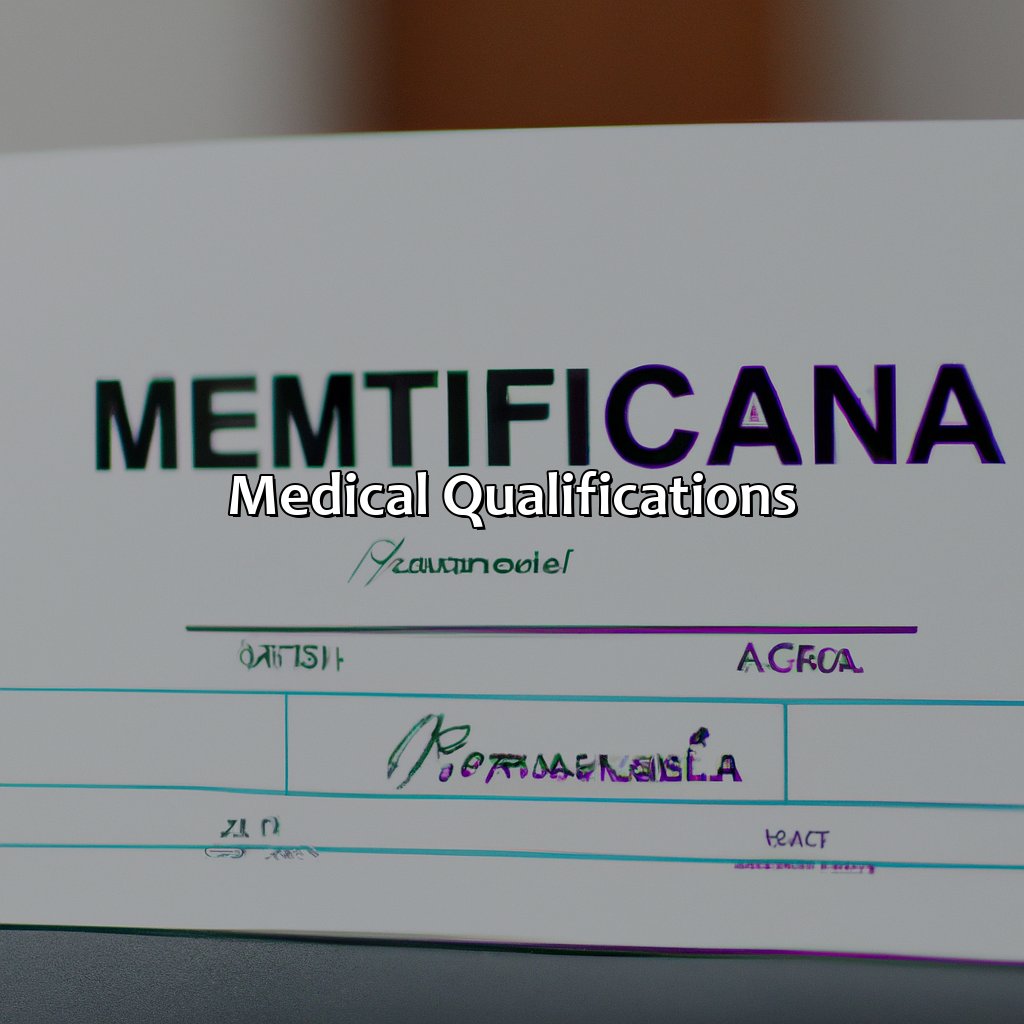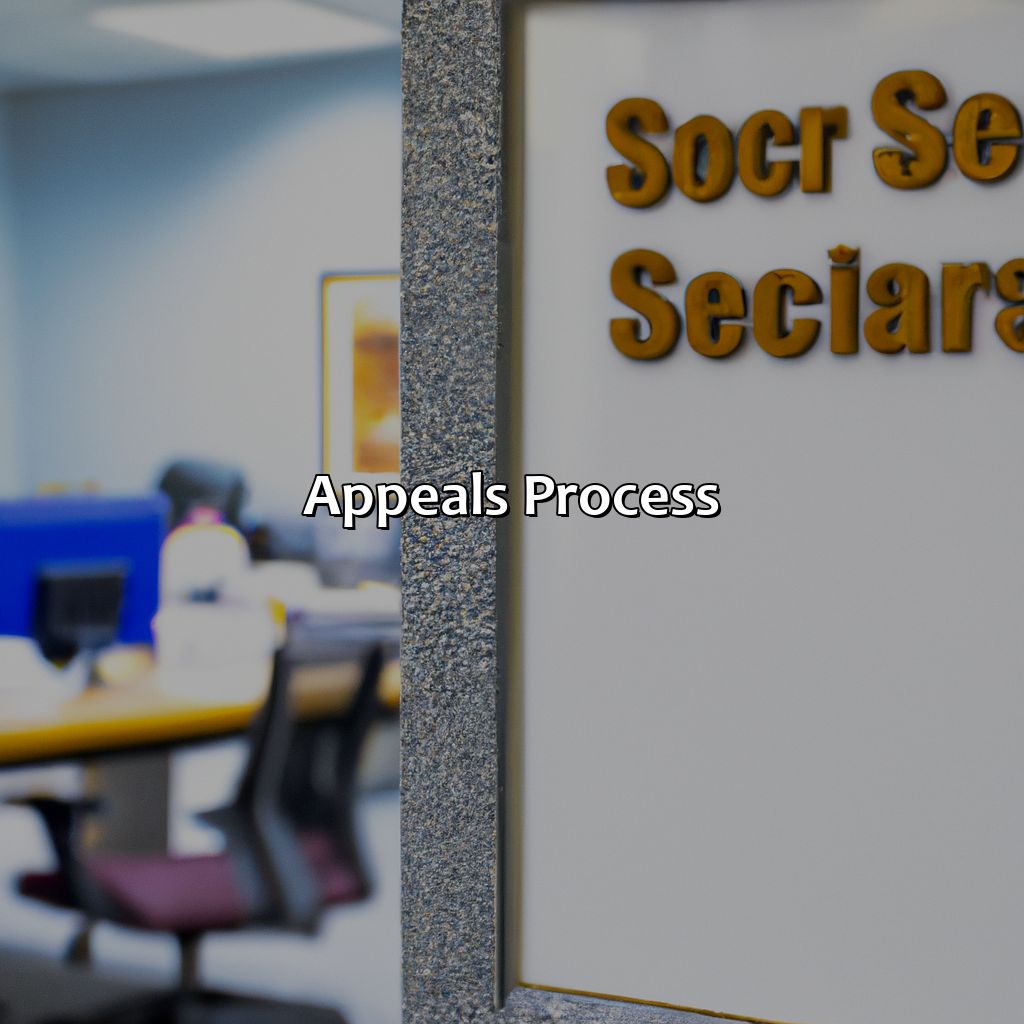How Can You Qualify For Social Security Disability?
Key Takeaway:
- Eligibility for Social Security Disability requires that the individual has a severe impairment that is expected to last at least 12 months or result in death.
- The medical qualifications for Social Security Disability require that the applicant’s disability prevents them from engaging in any substantial gainful activity and significantly limits their ability to perform basic work activities.
- The work history and income qualifications for Social Security Disability require that the applicant has earned enough work credits and not currently engaging in substantial gainful activity to be considered eligible for benefits.
Do you have a disability that prevents you from working? You may be eligible for Social Security Disability benefits. This article will guide you through the steps necessary to qualify and file for Social Security Disability.
Eligibility Criteria
Social Security Disability Eligibility: To qualify for Social Security Disability benefits, an individual must meet various criteria set forth by the Social Security Administration. These criteria include having a severe medical impairment that prevents one from performing substantial gainful activity. Additionally, the impairment must have lasted or be expected to last for at least 12 months or result in death. The individual must also have worked and earned enough work credits to be insured by Social Security.
To determine if the impairment is severe enough, the SSA uses a five-step evaluation process. This evaluation considers the individual’s ability to do substantial gainful work, the severity of their medical condition, whether their condition is listed in the SSA’s Blue Book of impairments, whether the individual can perform their past work, and if they can perform any other type of work.
Importantly, individuals applying for Social Security Disability benefits should not delay their application. The longer one waits, the more they may risk losing out on valuable benefits. If one’s condition prevents them from performing substantial gainful activity, they should apply immediately to lessen the risk of missing out on needed assistance.

Image credits: retiregenz.com by James Duncun
Medical Qualifications
To tackle medical qualifications for a disability, we will discuss two sub-sections. First, we’ll go over the severity of the disability and how it affects your ability to get Social Security Disability benefits. Then, we will cover the duration of the disability. This is an integral part in figuring out whether you are eligible for benefits.

Image credits: retiregenz.com by Joel Arnold
Severity of Disability
The degree of the impairment and its effects on daily life determine the level of disability. The Social Security Administration has a strict definition of disability, where it must significantly limit an individual’s ability to perform basic work activities and last for a year or more. Disabilities must be medically documented, treating doctors must record symptoms, diagnostic test results, and treatments. A thorough medical history in conjunction with documented evidence is imperative in establishing eligibility for social security disability.
It is crucial to have all medical documentation at your disposal when applying for social security disability benefits. As this process can take several months to years, keeping updated records of attending physicians, prescription medications, tests administered and their outcomes can prove invaluable in accelerating the approval process. The social security administration takes a long-term approach to disabilities; therefore, qualifying might be difficult but possible by having proper medical documentation.
Consider seeking legal counsel if denied benefits as you may file an appeal within a specified time frame based upon new evidential documents submitted concerning the severity of one’s disability claims. Several Non-profit law firms offer free evaluations concerning Social Security Disability claims that you can utilize.
Do not let fear hold you back from fighting for the benefits you deserve—Consult Medical professionals, disability lawyers who specialize in Social Security issues and apply with all medical documentation in your possession when submitting your application. The road ahead will be challenging but it’s worth staying proactive while ensuring everything necessary is made available as missing critical information may prolong proceedings significantly or disqualify your claim altogether!
Long enough to make you miss your job, but not long enough to make you miss those awkward office parties.
Duration of Disability
The length of a person’s disability is an essential factor in determining their eligibility for Social Security disability benefits. The duration of the inability to work determines whether you qualify for short-term or long-term disability benefits.
It is often difficult to determine precisely how long an individual will be disabled, as it depends on factors such as the severity of the condition and response to treatment. However, if your disability lasts 12 months or longer, it falls within the scope for the Social Security Administration’s long-term disability benefit program.
In addition, suppose you suffer from a disabling medical condition listed in the Social Security Administration’s Listing of Impairments and have been unable to work for at least 12 months. In that case, you may qualify for disability benefits under this category.
It is crucial to note that even if your condition does not appear on the Listing of Impairments, you may still be eligible for benefits if your illness affects your ability to perform essential job tasks and has resulted in an inability to work full-time.
A young woman with dementia was unable to continue working due to forgetfulness and difficulty learning new skills. She sought out assistance and found out about Social Security Disability Benefits. After undergoing a medical assessment and meeting all other requirements, she received monthly payments that helped her maintain financial stability despite her disabilities.
“Who needs a resume when you can just show the social security office your collection of participation trophies?”
Work History and Income Qualifications
To get Social Security Disability (SSDI) benefits with work history and income qualifications, you must understand how the Social Security Administration (SSA) decides if you are eligible.
The SSA considers two main things: work credits and substantial gainful activity. If you understand these, you can find out if you can get SSDI benefits.

Image credits: retiregenz.com by Harry Arnold
Work Credits
To qualify for Social Security Disability benefits, one must earn sufficient work credits under the system. Work credits are awarded to individuals based on their earned income and vary from year to year. The number of credits required varies depending on age and disability onset date.
If an individual does not earn enough work credits, they may be eligible for Supplemental Security Income (SSI) instead. SSI is a needs-based program that provides cash assistance to disabled individuals with limited resources.
It’s important to note that work credits can only be earned through paying Social Security taxes on income from employment or self-employment. Voluntary contributions or other sources of income do not count towards earning work credits.
Understanding how work credits are earned and counted can be confusing, which is why it’s recommended to seek the guidance of a qualified Social Security Disability lawyer or representative who can assist with navigating the system.
Additionally, many individuals who apply for disability benefits are initially denied, leading to the need for appeals and further legal proceedings. It’s crucial to stay informed throughout the process and fight for the benefits you rightfully deserve.
One such individual, Jane Smith, worked long hours in a physically demanding job for years before being diagnosed with a debilitating condition that left her unable to continue working. Despite her hard work and payments into the Social Security system, she initially struggled to qualify for disability benefits due to inadequate documentation and lack of understanding about the application process. With the help of a skilled lawyer, she was eventually granted benefits and able to receive critical support during this difficult time in her life.
Looks like my hobbies of binge-watching Netflix and napping don’t count as substantial gainful activity for social security disability.
Substantial Gainful Activity
The measure of a person’s ability to work and earn income is known as ‘substantial gainful activity’. Social Security Disability requires that an applicant has met certain qualifications. These qualifications indicate that the applicant cannot perform a substantial amount of work as determined by both their past relevant work history and earnings. In other words, substantial gainful activity refers to the minimum level of income that a person can earn in order to perform work on a regular basis.
To qualify for social security disability benefits, an applicant must meet specific standards set forth by the Social Security Administration (SSA). If an individual is able to perform substantial gainful activity, they will not be considered eligible for disability benefits. Additionally, any additional medical conditions or limitations on physical abilities will also be considered when determining eligibility.
It is important to note that not all types of work are considered substantial gainful activities. For example, if someone performs unpaid volunteer work or receives occasional income from selling crafts, this would not typically be considered substantial gainful activity and would not disqualify them from receiving social security disability benefits.
Pro Tip: To help ensure your eligibility for social security disability benefits, it is important to keep detailed records of your work history and earnings. This information can help demonstrate the extent and limitations of your ability to perform substantial gainful activity.
Applying for social security disability is like playing the lottery, except the odds are not in your favor.
Applying for Social Security Disability
Qualifying for Social Security Disability Benefits
To qualify for Social Security Disability benefits, one must meet specific medical and non-medical criteria. These criteria include being unable to work for at least 12 months due to a severe physical or mental health condition. Additionally, one must have a work history of paying taxes into the Social Security system.
When applying for benefits, one must provide extensive medical evidence of their condition, including treatment records and test results. The Social Security Administration will also review the applicant’s work history and earnings.
It is important to note that the application process can be lengthy and complex. Seeking the assistance of a qualified attorney or advocate can greatly improve the chances of success.
In one instance, a woman with lupus applied for disability benefits and was initially denied. However, with the help of an attorney, she was able to appeal and ultimately receive her benefits.

Image credits: retiregenz.com by Adam Arnold
Appeals Process
The process for qualifying for social security disability has sub-sections. These include:
- Reconsideration
- Administrative Hearing
- Appeals Council
- Federal Court Review
Completing this appeals process is the solution. Each sub-section offers a step to the final decision on your SSDI claim. Here, we explain each one in brief.

Image credits: retiregenz.com by Yuval Washington
Reconsideration
After the initial application for Social Security disability benefits is denied, the next step is to request a review, known as Reconsideration. This process entails a fresh evaluation of the medical and non-medical evidence that was initially submitted with the first application. During this phase, no new evidence or documentation may be presented by the claimant.
The Social Security Administration recommends that applicants enlist the aid of legal representation or an advocate, skilled in navigating the process, to increase their chances of success in this stage. Reconsideration takes an average of three to four months to complete and generally results in further denial of benefits.
It should be noted that appealing decisions takes time and effort but can yield favorable results if persistence is maintained throughout the entire sequence of appeals processes. It’s crucial to have clear knowledge about each phase and to keep track of deadlines for filling appeals.
According to data provided by SSA, only about 14% of initial applications are approved upon submission while reconsideration reviews result in roughly 12% acceptances on submissions reviewed.
When it comes to Administrative Hearings, you’re better off bringing a lawyer than a magic eight ball.
Administrative Hearing
When claiming social security disability benefits, an authoritative tribunal hears any appeals to a denial of benefits. This ‘Appeals process’ is conducted at an Administrative Hearing where the claimant must present medical evidence and demonstrate their inability to work due to their disabilities. The hearing judge considers arguments from both parties and, based on the facts presented, makes a decision whether or not to award benefits.
During the Administrative Hearing, the judge will examine medical records to evaluate the extent of impairment and assess how it affects your ability to perform substantial gainful activity. Additionally, they examine vocational and work history to determine which jobs you might be able to perform. They may require another qualified professional such as a vocational expert or medical consultant’s testimony if needed before making a decision.
It’s essential to note that each Administrative Hearing is unique since circumstances around each claim are different. The Social Security Administration reviews each case thoroughly before scheduling administrative hearings ensuring all necessary details are available for legal conclusions.
An example was David Rinehart vs. Carolyn W Colvin case held at the Seattle Opera House on December 15, 2014. In this instance, Administrative Law Judge Winston L Hall listened to arguments from both parties before awarding David Rinehart social security disability benefit as he met the criteria for eligibility established by law.
Even the Appeals Council needs a little help making decisions sometimes – they should just consult my Magic 8 Ball and save everyone some time.
Appeals Council
When your Social Security Disability claim is denied, you can file a request for reconsideration. If that request is also denied, you can appeal the decision to the Administrative Law Judge (ALJ). The ALJ hearing involves your medical records, testimony and cross-examination by the judge. However, if the ALJ denies your appeal too, an Appeals Council exists for further review and possible reversal of the decision. The council does not re-try cases but evaluates whether the ALJ made any legal errors.
If the Appeals Council denies your request for review or upholds the ALJ’s decision, then you may choose to file a lawsuit in federal court. Keep in mind that going to federal court could be a lengthy process.
It’s important to note that while there are different stages of appeal in SSD claims, only about 10% of cases are approved at each level. According to Nolo.com, approximately 70% of claims end at the hearing stage with an ALJ decision.
Federal Court Review
The final step of the appeals process in Social Security Disability cases is a review by a judicial body. This involves presenting your case to a Federal Court Judge, who will review all of the evidence. The judge will then make a final determination of whether or not you are entitled to receive benefits. This step is known as the Court Review stage.
During Court Review, your attorney will present your case before the judge and argue why you should be approved for social security disability benefits. It is important that all relevant information and evidence is presented at this time, as it can significantly impact the judge’s decision. The judge may also require additional information or clarification from your lawyer.
It is important to note that not all cases reach this stage of appeal. If your claim has been approved at a prior level, or if you have settled with the Social Security Administration prior to filing an appeal, then Court Review may not be necessary.
In one notable case, a woman with a rare autoimmune disorder fought for years to receive disability benefits. After being denied multiple times and exhausting all other avenues of appeal, her case eventually went before a federal court judge who ruled in her favor. Her persistence paid off and she was finally able to receive the financial assistance she needed to manage her condition.
Some Facts About Qualifying for Social Security Disability:
- ✅ To qualify for Social Security Disability benefits, you must have a qualifying medical condition that prevents you from working. (Source: Social Security Administration)
- ✅ Your condition must be expected to last for at least 12 months or be terminal. (Source: Social Security Administration)
- ✅ You must have worked and paid Social Security taxes for a certain period to be eligible for benefits. (Source: AARP)
- ✅ The application process for Social Security Disability benefits can take several months to over a year. (Source: DisabilitySecrets)
- ✅ If your application for Social Security Disability benefits is denied, you have the right to appeal the decision. (Source: Social Security Administration)
FAQs about How Can You Qualify For Social Security Disability?
How can you qualify for social security disability?
To qualify for Social Security Disability, you must have a disability that meets the Social Security Administration’s definition of a disability. You must also have worked long enough and recently enough to earn sufficient credits (usually at least 20) through payroll taxes taken out of your paychecks.
What is the definition of disability according to the Social Security Administration?
The Social Security Administration’s definition of disability is based on your inability to work. It means that you have a physical or mental impairment that lasts for at least 12 months or is expected to result in death, and this impairment prevents you from engaging in any substantial gainful activity.
How do I prove my disability to the Social Security Administration?
You must provide medical evidence that shows you have a medically determinable impairment and how it limits your ability to work. This evidence should come from acceptable medical sources, such as licensed physicians, psychologists, and other healthcare professionals.
What if my application for Social Security Disability is denied?
If your application for Social Security Disability is denied, you can appeal the decision. You have 60 days from the date you receive the written decision to request an appeal. The appeals process includes a reconsideration, a hearing, and a review by the Appeals Council, and can take several months to several years to complete.
What kind of benefits can I receive through Social Security Disability?
Social Security Disability provides two types of benefits: Disability Insurance Benefits (DIB) and Supplemental Security Income (SSI). DIB is based on your work history and pays a monthly benefit amount based on your lifetime average earnings. SSI pays a monthly benefit amount to disabled individuals who have limited income and resources.
What if my disability improves or I am able to return to work?
If your disability improves or you are able to return to work, you must notify the Social Security Administration. Your disability benefits may be terminated if you are able to engage in substantial gainful activity or your condition improves to the point that you are no longer disabled according to their guidelines.


